Abba Seraphim attends Ethiopian Orthodox Festival in London
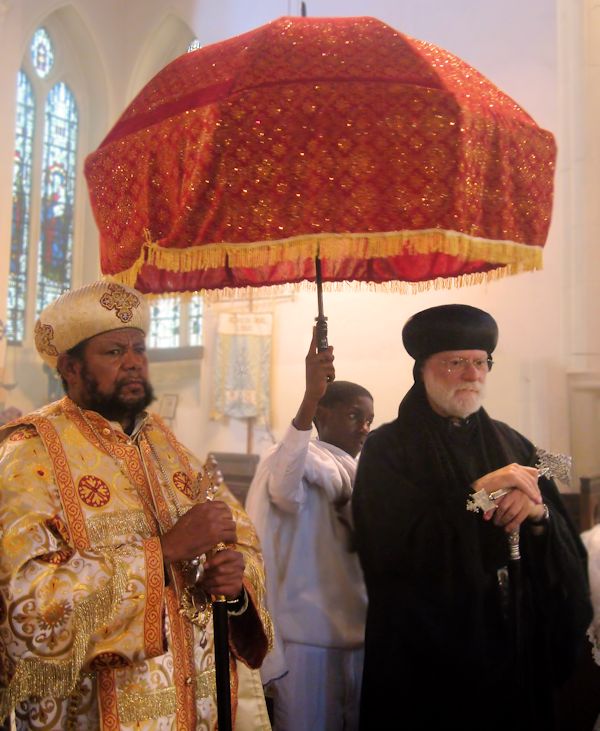
For the second year running, Abba Seraphim was happy to attend the annual patronal festival of Saint Mary of Zion (Tserha Tsion) Ethiopian Orthodox Tewehedo Church in London on 3 December. The congregation is currently worshipping in St. James the Great Church in Lower Clapton but has recently purchased an adjacent site at 229 Lower Clapton Road, which includes a former cinema, which had lately been used as a night club). Imaginative plans are in hand to convert this building along traditional lines, with the historic Church of St. Mary of Zion at Axum as the inspiration. The project also includes a community hall, school rooms and an episcopal residence.
This parish has a long history of over thirty years and became established under the oversight of the late Archbishop Yohannes (died 1997), who served first as priest-in-charge and later as Bishop of Western Europe with his seat in London. Since 2006 Abuna Antonios has been the resident Ethiopian Archbishop.
In a brief address to the congregation, at the conclusion of the liturgy, Abba Seraphim spoke of his delight to share in their festival and participate in the holy joy of the congregation, and especially at their purchase of the premises after many years of searching. This was a true blessing of God and he congratulated them on their faithfulness. He not only brought them greetings from their brothers and sisters in the British Orthodox Church, but also as one of the Vice-Presidents of the Council of Oriental Orthodox Churches in the UK.
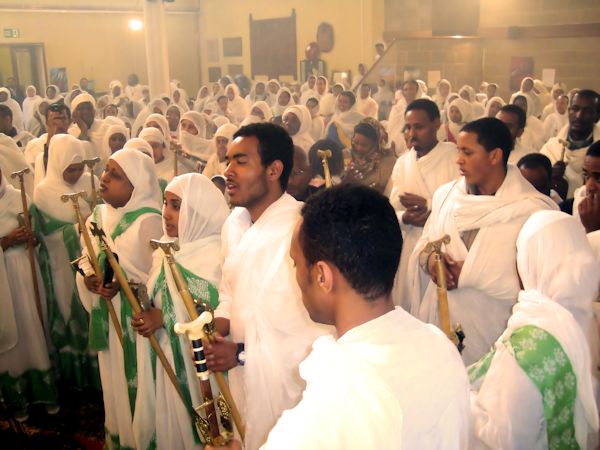
Abba Seraphim lectures on British Orthodox History (Video)
Abba Seraphim ordains priest for Eritrean Orthodox
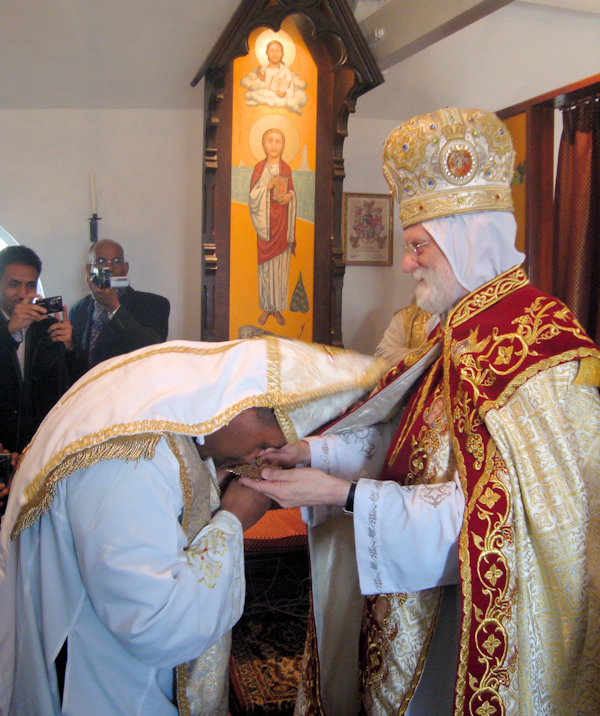
At the request of His Grace Bishop Makarios, Overseer of the North American Archdiocese of the Eritrean Orthodox Church and Bishop of the Eritrean Orthodox Church in diaspora, Abba Seraphim ordained Deacon Habtom Ftuwi, to serve the Medhane Alem Eritrean Orthodox community in Manchester.
Abba Seraphim’s contact with the Manchester community goes back to 10 April 2006 when he chaired a meeting at Cheetham Hill to find ways of establishing the incipient community in a regular place of worship. Since then the congregation has grown and maintained regular worship but they have depended on occasional visits (sometimes six monthly) from Eritrean clergy in London for the sacraments.
Following Bishop Makarios’ request, Abba Seraphim invited Deacon Habtom and representatives of the Manchester community to meet with him at the British Orthodox Church Secretariat in London and required supporting documentation to ensure the the proposed ordination conformed to canon law.
On 19 November the ordination took place at St. Mark & St. Hubert’s Orthodox Church in Cusworth Village, South Yorkshire. During the Liturgy Abba Seraphim was assisted by Fathers Simon Smyth and David Seeds, Archdeacon Alexander Astill, Deacons Christopher Barnes and Johannes Gebrhiwet. A large contingent of the congregation attended from Manchester, so that the church was full. After the kiss of peace, Archdeacon Alexander read out the letters from Bishop Makarios delegating Deacon Habtom’s ordination to Abba Seraphim, before Abba Seraphim asked those present if they wanted Deacon Habtom to be their priest, to which the response was a resounding assent. Finally Deacon Habtom was asked if he accepted this call and his wife, Arsema, whether she agreed to his ordination and would support him in his ministry, to which both assented. Immediately prior to the ordination Deacon Habtom swore the pledge taken by all ordinands to maintain the Orthodox Faith and to serve the people, after which he knelt and bowed to all present.
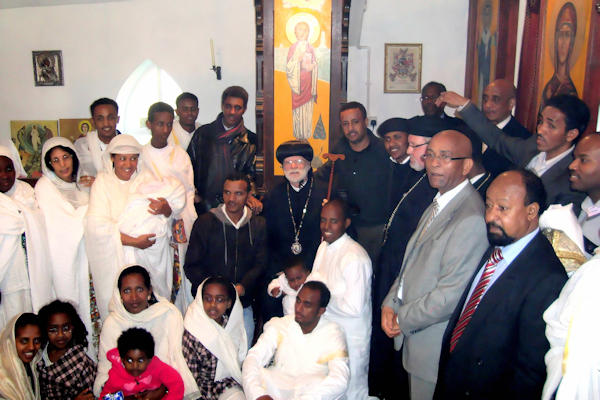
In his homily Abba Seraphim spoke of the Providence of God and our need to bring our wills into conformity with His in the same way that the Mother of God did when confronted by the Archangel. He also spoke of the continuity of priestly ministry throughout the generations and in different places. This very day the funeral was taking place in Dublin of a dear friend, Archimandrite Serge Keleher of the Greek Catholic Church, who died after a long and fruitful priestly ministry. This year also marked the 40th anniversary of Abba Seraphim’s own priestly ordination. On the day of his ordination he had come straight from the funeral of another priest, whose ministry had been over 70 years. Such was the Providence of God that as some priests departed to their reward, others answered the call and served in their place. Abba Seraphim highlighted two scriptural texts, our Lord telling the Apostles, “Ye have not chosen me, but I have chosen you, and ordained you, that ye should go and bring forth fruit” (John X:16) and St. Paul writing about ministers as servants of Christ and stewards of the mysteries of God, “Moreover it is required in stewards that one be found faithful.” He spoke of the prime importance of fidelity to the Faith and to the ministry of service.
At the conclusion of his ordination, Father Habtom was invested with his priestly robes and the congregation enthusiastically acclaimed Axios as well as joyful ululations ! At the end of the Liturgy Abba Seraphim gave the new priest the Holy Breath and the traditional charges to a newly ordained priest were read. Afterwards both British and Eritrean joined together in a traditional Eritrean meal in the Battie-Wrighton Memorial Hall, followed by traditional church dances by the choir. As the weather was unseasonably mild this took place in the courtyard in front of the church. The debteras in their white robes and holding their sistra and prayer sticks swayed rhythmically to these ancient traditional Christian chants from the Horn of Africa while the haunting sounds and the solemn beating of a drum wafted across the sleepy Yorkshire village.
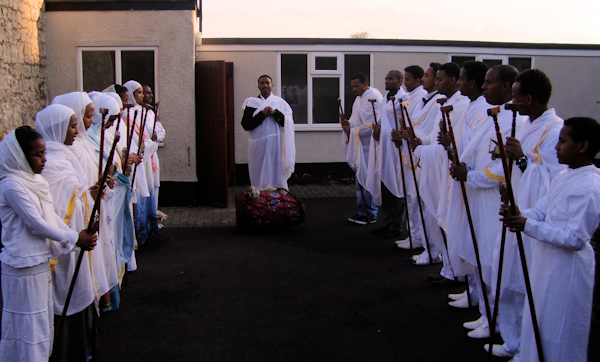
Abba Seraphim lectures on British Orthodox History
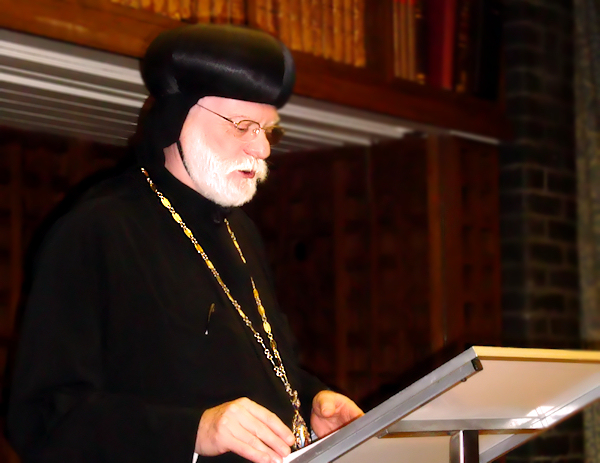
At the invitation of the Oxford University Orthodox Christian Student Society, Abba Seraphim gave a talk on “The Orthodox Heritage of Pre-Schism Britain” at Trinity College, Oxford, on 17 November. He began by pointing out that as a Metropolitan of the Alexandrian Patriarchate, within the Coptic and Oriental Orthodox traditions, the Great Schism of 1054 might seem to be somewhat beyond his remit, as it was a schism between two Chalcedonian churches which had been separated from that portion of the Orthodox Church for centuries. However, as an Englishman with canonical responsibility for a community of British Orthodox congregations he had a keen interest in Britain’s Orthodox heritage and what we may be learnt from it.
The Insular Church from its foundation was an integral part of the universal church, holding to a common faith and order. It withstood successive waves of persecution and when the Constantinian Peace of the Church was established, its hierarchs took their place in the counsels of the church. St. Athanasius the Great commended the British Church for upholding the Nicene Faith and very early we find it drawing on the support of sister churches to root out heresy.
Abba Seraphim examined the eastern origins of early British monasticism, especially links with Coptic Egypt; the role of saints and martyrs; the British enthusiasm for pilgrimages; the evangelism of the Irish saints and later Anglo-Saxon missions (Boniface & Willibrord); the evidence of liturgical and cultural links with other Christian cultures in Europe and the significant cross fertilisation of art and learning. He also highlighted the development of the Roman Primacy from one of honour to one of jurisdiction, examining the traditions of Pope Eleutherius, Augustine of Canterbury and Theodore of Tarsus and the gradual introduction of the filioque.
In concluding Abba Seraphim observed that the title of his talk was capable of two interpretations. The first might be simply to demonstrate that the Orthodox faith was manifested fully in the British Church prior to 1054, whereafter it gradually became more Romanised and fell into schism or worse; the second might be that the British Church in its first thousand years was not only fully Orthodox in its faith and order, as manifested by its full participation in the life and witness of the universal church, but that it made its own significant contribution to the faith, which carried the Gospel to huge populations but enriched and renewed Christendom with its own unique character and perception.
Following questions and a vote of thanks, Abba Seraphim was invited to join representatives of the society for dinner at a local restaurant.
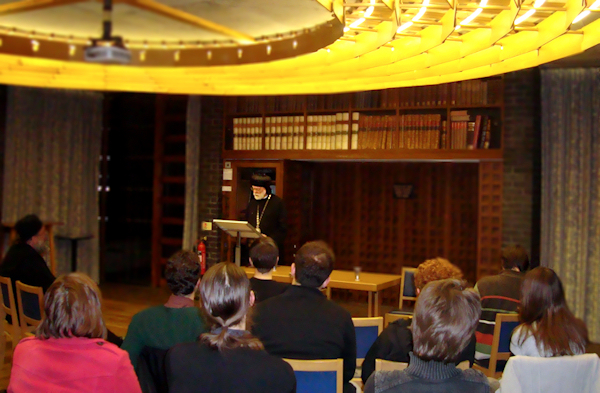
Abba Seraphim talks on current situation in Egypt
At the invitation of The Waterloo Place Group, a private luncheon club composed of School Chaplains, Abba Seraphim spoke on 10 November at The Athenaeum Club in London. His subject was the background to the current situation of the Coptic Orthodox Church in Egypt. Briefly tracing the political history of Egypt since the 1952 Revolution, Abba Seraphim spoke about the outrages of El Kosheh (New Year’s Eve, 1999) and Nag Hammadi (Christmas Eve 2010) leading to the acceleration of events over the past twelve months. Throughout all the terrible events of this period and the uncertainty of the future, the message of His Holiness Pope Shenouda has been clear, “We do not know anything concerning the future. The Lord said: Do not care for tomorrow, tomorrow cares for itself. The future is in the hands of God not ours.”
